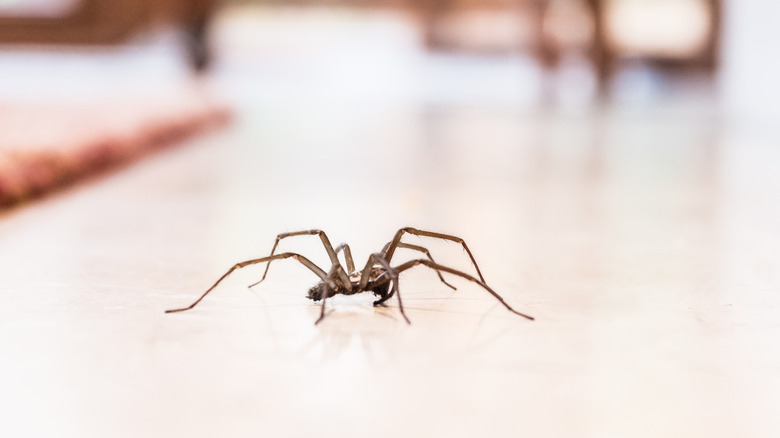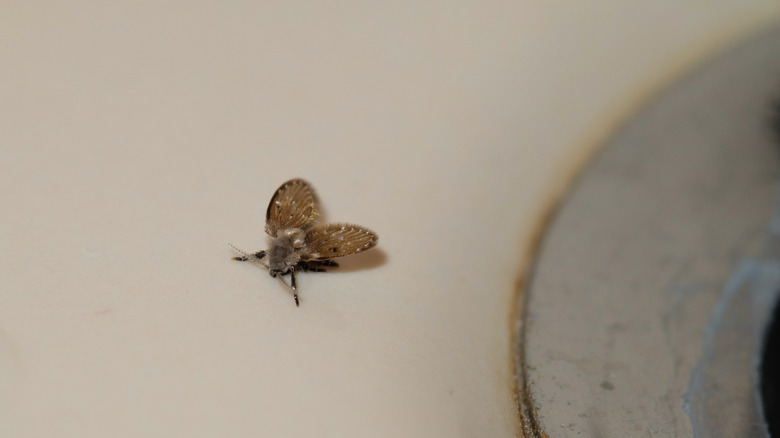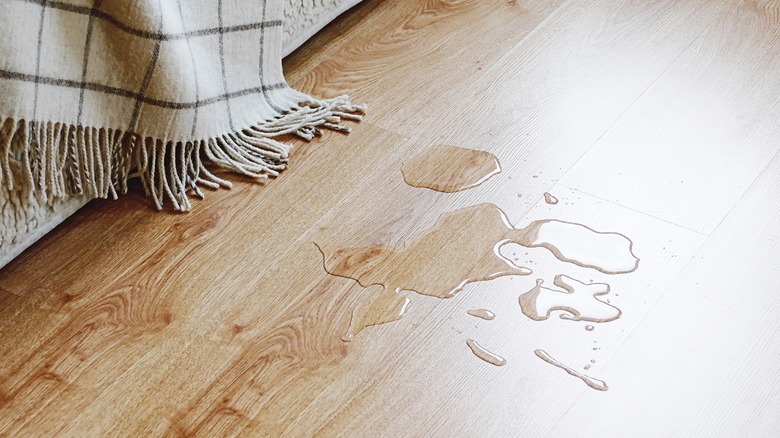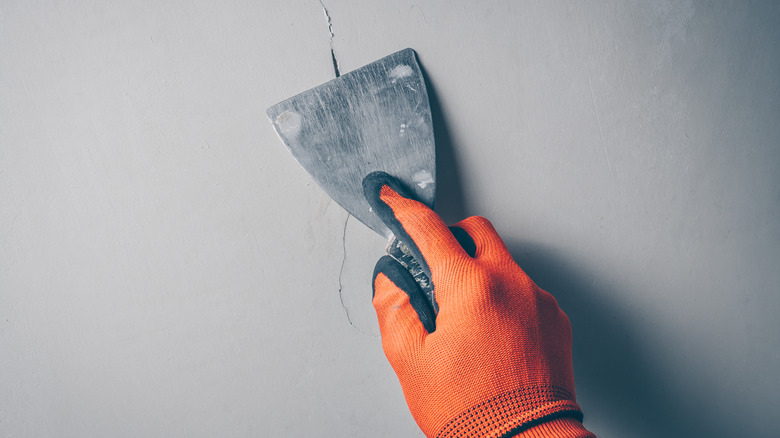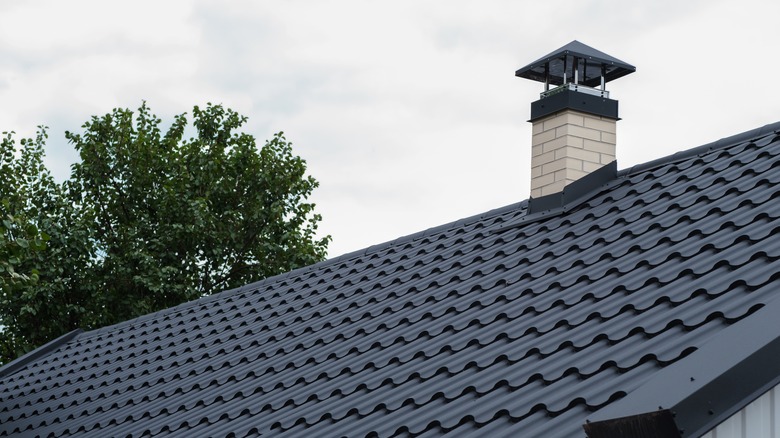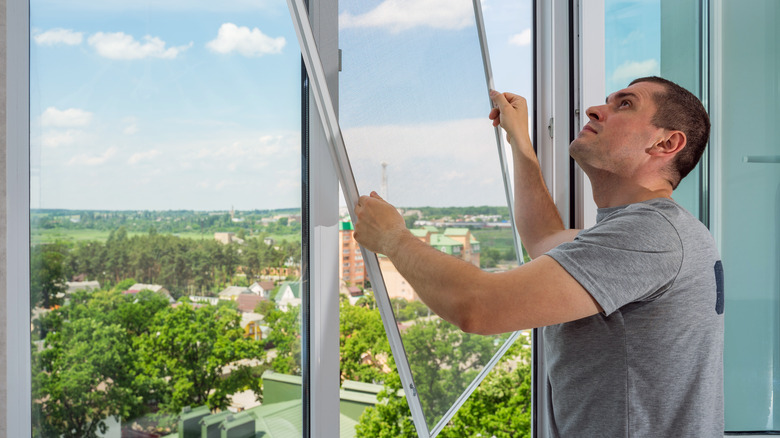These Common Mistakes Might Be Attracting Spiders To Your House
If you've noticed more spiders in your house than you're comfortable with, you're not alone. These eight-legged visitors are common in many homes, but that doesn't mean you have to live with them. First, be aware that common house spiders, such as the American house spider and cellar spiders, are often what you'll find lurking in corners or basements. They're mostly harmless but can be a nuisance with their webs. Then, there are the more intimidating types, like wolf spiders.
While not all spiders pose a risk to humans, they can be unsettling. The key to reducing their presence isn't just about dealing with the spiders themselves; It's about addressing the factors that make your home attractive to them. Spiders are often in your home for two reasons — shelter and food. Your mission is to disrupt these comforts. Also, keep in mind that they venture indoors during extreme weather. This is especially true during the colder months when your warm home becomes a haven for these cold-blooded creatures. This seasonal migration is why you might notice an uptick in spider sightings at particular times of the year.
Leaving lights on at night
You're unintentionally rolling out the red carpet for spiders every time you leave your lights on at night. Here's the deal: Bright lights don't just illuminate your home; They're beacons for flying insects, and where there are insects, you can bet spiders won't be far behind. Any spot near these insect-attracting lights becomes prime real estate for a spider looking for its next meal. Here's how to tackle this issue head-on and keep bugs off your porch. Start by minimizing outdoor lighting. You don't need to live in the dark, but be strategic. Use motion sensor lights that only turn on when needed. This reduces the time lights are on, subsequently cutting down on insect (and spider) attraction. Use a similar strategy indoors. Draw your blinds or curtains at night. This simple act significantly decreases the amount of light spilling outside.
Still, there's more you can do. Replace your standard outdoor bulbs with yellow sodium vapor lights. These aren't as appealing to insects as white lights, so they're less likely to draw in a crowd of bugs — and, by extension, spiders. They provide long-lasting light with lower energy consumption. Plus, their placement on railings can direct illumination in a more controlled manner, reducing the spread of light that can attract insects from afar. Also, remember that it's not just about light type or usage. Regularly clean around light fixtures to remove webs and discourage spiders from setting up camp.
Not managing other insect populations
Let's face it. Your spider problem is actually an insect problem. Spiders are drawn to places where they can easily find their next meal. Common insects like flies, mosquitoes, moths, and especially drain flies turn your home into a spider's dining paradise. Here's your action plan: Start with the insects. To get rid of drain flies, you need to clean your drains regularly since those pesky little bugs are often found near sinks and drains. Use a mixture of vinegar and baking soda to break down organic matter that drain flies love. Follow up with boiling water to ensure these breeding grounds are less inviting. Next, tackle the broader insect issue. Keep your windows and doors closed or screened, especially during evenings when insects are most active. Ensure your home is clean and free of food crumbs and sticky spots. Regular vacuuming and surface cleaning make a big difference. Insects thrive in dirty environments, so a clean home is less attractive to them.
Don't ignore standing water, either. It is a breeding ground for mosquitoes. Regularly drain water collected in plant saucers, buckets, or birdbaths. If you have a pond, consider introducing fish that feed on insect larvae. Lastly, think about professional pest control if you're dealing with a severe insect infestation. Sometimes, DIY methods aren't enough, and that's okay. A professional can provide targeted treatments to reduce the insect population, thereby making your home less appealing to spiders.
Having indoor plants
Continuing the topic of feeding, indoor plants attract many insects that spiders feed on, making them unintentional accomplices in your spider problem. Plants can become mini-ecosystems for various insects, providing food and shelter for spiders. Let's tackle this issue effectively. First, manage your plant's watering. Overwatering creates a moist environment that attracts gnats and other insects. Ensure you're watering your plants just enough to keep them healthy — but not so much that water stagnates. If you have saucers under your plants, empty them regularly to avoid standing water.
Next, keep an eye out for plant pests like aphids and mites. These tiny insects are spider magnets. Inspect your plants regularly for any signs of infestation. If you spot pests, deal with them promptly using natural insecticides like diatomaceous earth. Another effective step is introducing natural predators into your indoor garden. For example, ladybugs feast on aphids and can help keep their population in check. This natural method reduces the need for chemical insecticides, which can sometimes do more harm than good. Lastly, consider the location of your plants. If they are near windows or doors, they might be acting as a bridge for outdoor insects to come inside. Relocate your plants away from these entry points if possible. This simple rearrangement can significantly reduce the influx of insects and the spiders that feed on them.
Ignoring moisture issues
Moisture is one of the key factors spiders seek. Like most creatures, they need water to survive. Damp environments also tend to host a range of insects, which are their primary food source. Here's what you need to do: First, address any moisture problems in your home. This means fixing leaks, whether they're in your plumbing, roof, or basement. Even a small drip can create a moist environment that's attractive to spiders. Next, focus on your home's ventilation. Areas like the basement, attic, and bathrooms are prone to humidity. Use dehumidifiers in these areas to keep the moisture levels down. Ensure that your bathroom fans and kitchen vents are working properly to remove the excess moisture from cooking and showering. Another key step is checking for and sealing any cracks or gaps in or around your home's foundation, walls, or windows. These can let in moisture, especially during rainy seasons. Proper sealing not only keeps moisture out but also prevents spiders and insects from finding easy entry points.
It's also important to manage the outdoor space around your house. Make sure your gutters and downspouts are clear and functioning correctly. They should direct water away from your home's foundation. If you have any standing water in your yard, such as in birdbaths or plant saucers, empty them regularly. Finally, take a look at your landscaping. Plants should be positioned away from your home's foundation. Overgrown vegetation can trap moisture against your house and create an ideal habitat for spiders.
Neglecting to clean your yard regularly
Tackling those pesky spiders by cleaning up your yard is a smart move to reduce the population in your house. Tall grass and dense bushes are like a VIP lounge for insects, and spiders are always eager to join the party. So, be sure to regularly mow your lawn and trim those bushes.
Making your yard less of a bug paradise is the goal here. Now, let's deal with the clutter. Piles of wood, leaves, or grass clippings? They're also magnets for bugs, and as you know by now, where there are bugs, there are spiders. Clearing this stuff out will significantly reduce your creepy crawly guests. Also, keep those trash cans sealed tightly. Here's another tip: Manage your outdoor furniture and decor. Spiders love to hide under patio chairs or in the nooks of garden decorations. Regularly clean those areas, too. And if you have a garden, move storage bins regularly, even if it's just a slight shift to disturb any potential spider hideouts.
Not sealing cracks and openings
Unsealed cracks are like open doors for spiders. It's vital to identify and seal these gaps to keep spiders out. Make it part of your regular home maintenance routine. Most commonly, you'll find cracks around windows, doors, and stairs. But don't just stop there. Check where utility pipes enter your house; These are often overlooked entry points for spiders. Once you've identified these cracks, it's time to seal them. For smaller gaps around windows and doors, use caulk. It's easy to apply and effectively blocks tiny spaces where spiders sneak in. For larger cracks, especially in the foundation, you might need to use a more robust sealant or even consider professional help.
Don't forget to check the corners of your rooms, along baseboards, and around ceiling fixtures. These are places where spiders often crawl. A simple caulking job can close these pathways. Finally, consider the condition of your window and door screens. Tears or holes in screens are an open invitation for spiders. Repair or replace damaged screens to ensure a tight seal. Another important area is your home's exterior. Look at the siding and where it meets your home's foundation. Gaps here can be potential entry points for spiders and other pests. Sealing these will reinforce your home's defense against unwanted guests.
Uncovered chimneys
Uncovered chimneys are common entry points for spiders. Your best bet is to install a chimney cap. This is a simple yet effective barrier that prevents spiders from dropping down into your living space. In addition to spiders, they can also keep out birds, squirrels, and other critters that might want to make your chimney their home. Chimney caps come in various sizes, so make sure you get one that fits your chimney snugly. Next, let's talk about firewood storage. Firewood can be a breeding ground for spiders, and if you store it too close to your home, you're inviting them in. Store your firewood away from your house's foundation. By doing so, you reduce the chance of spiders hitching a ride into your home when you bring in wood for the fireplace.
Another important step is to install a door on your fireplace. When you're not using the fireplace, a closed door can be a significant deterrent to spiders looking for a warm place to settle. Make sure the door fits well and closes tightly. Also, when it comes to firewood, always burn the oldest wood first. Over time, wood piles can become perfect habitats for spiders. By using the oldest wood first, you're disrupting any chance for spiders to establish a long-term presence. Regularly inspect and clean your vents as well. Dust and debris can accumulate, providing hiding spots for spiders.
Leaving food out
Now, let's turn our attention to food. Leaving food out is not just an invitation for ants and other pests; It indirectly sets the table for spiders, too. As mentioned earlier, insects are a food source for spiders, so controlling them is key to managing your spider situation. First things first: Be diligent about food storage. Don't leave food out uncovered. This includes pet food. Store food in airtight containers or the refrigerator. Crumb management is also crucial. Clean up immediately after meals. Wipe down your counters, sweep your floors, and don't forget to clean under appliances and furniture where crumbs can accumulate unnoticed. Even the smallest crumb can be a feast for an ant, and where there are ants, spiders will follow. Another point to consider is fruit and vegetable storage. Overripe or rotting produce can attract fruit flies. Regularly check your fruit bowl and discard spoiled items.
However, it's not just about food. Spilled liquids, especially sweet drinks, are a big draw for ants. Be vigilant about cleaning up spills immediately. Also, take your trash out regularly, and make sure your trash can has a tight-fitting lid. If ants and other insects are attracted to your trash can, spiders won't be far behind. Lastly, consider a regular deep cleaning schedule that includes areas like pantries where food spills are common. Regular cleaning with ammonia can disrupt the scent trails left by ants, making your home less navigable.
Not using screens on windows and doors
Insect screens are a crucial but overlooked aspect. They are your first line of defense against insects, which, as we know, are spider magnets. They are essentially mesh barriers designed to fit over windows and doors, allowing fresh air in while keeping insects out. They're especially important during warmer months when insects are more active and you're more likely to open windows for ventilation. Of course, there are different types of screens to consider. Standard screens, usually made of fiberglass or metal mesh, are the most common. If your house is infested with smaller insects, look for fine mesh screens that offer extra protection.
When it comes to brands and options, there are a few well-reviewed ones. For example, Andersen Windows insect screens are known for their durability and ease of installation. If you're looking for something more temporary or adaptable, consider magnetic screens like the Flux Phenom Magnetic Screen Door, which can be easily installed on doorways without tools. It's important to regularly check screens for tears or gaps. Even small holes can be an entry point. If you find any damage, repair it immediately. Many hardware stores sell screen repair kits, or you can opt for professional repair services. Lastly, consider installing screens on vents or other large openings in your home. These are often overlooked but can be just as inviting to insects as windows and doors.
Leaving clutter in the attic and around the house
Finally, let's address why the (often forgotten) attic is a hotspot for spiders. Attics are typically quiet, undisturbed, and cluttered — making them perfect for spiders to live and breed. The clutter provides hiding spots, and the lack of human activity means they can thrive without interruption. The first step in dealing with this is decluttering your attic. Try to keep things orderly and off the floor when possible. Vacuum and dust the room frequently, paying special attention to corners, under furniture, and behind appliances — places where spiders are likely to hide and build their webs. Try to remove any spider webs you find.
Don't forget to tackle any closets in the attic, too. Spiders can find their way into the most unlikely places, including your wardrobe. Keep your closets organized and free of clutter. Go through your stuff and get rid of things you no longer need. It might seem daunting, but it's essential. Decide what you need to keep, donate, or throw away.
But don't stop at the attic. If you have clothes or shoes that you don't wear often, store them in sealed bags or boxes. Extend this decluttering to your entire house, particularly areas like basements, garages, and storage rooms. Keep things organized and off the floor as much as possible. Use storage solutions like shelves and cabinets to keep items tidy and contained.
